IAN BREMMER, FOR THE STRAITS TIMES
Fraying consensus in Europe a top risk this year
Sign up now: Get ST's newsletters delivered to your inbox

Alexis Tsipras (centre), leader of Greece's far-left Syriza party, leaves the Presidential palace in Athens in this file photo. The first sign of obvious trouble could come from Greece, where the populist left-leaning Syriza could win a snap election and form a government early this year. --PHOTO: REUTERS
At the height of the euro zone crisis in 2011 and 2012, European Union (EU) member states forged political consensus to manage economic turmoil. Today, though economic anxiety is again rising, the panic is gone, and so is political unity. It is likely to be a tough year for policymakers and economies across the continent.
First, the rise of anti-European political parties within member states will continue. The first sign of obvious trouble will come from Greece, where the populist left-leaning Syriza, led by Mr Alexis Tsipras, will likely win a snap election and form a government early this year.
In Spain, though structural reforms enacted over the past three years will help power one of the euro zone's fastest-growing economies this year, unemployment will remain exceptionally high.
Also, spring elections in Catalonia will fuel secessionist pressure, and the meteoric rise of another leftist anti-establishment party, Podemos, will leave Spain's government weaker after national elections in October. Voters in Italy and France are watching and will likely exert greater pressure on their own governments.
The result will be a virtual halt in Europe's economic reform. And as the surging popularity of anti-EU parties like France's Front National, Britain's UK Independence Party, and even Ger-many's Alternatives for Deutschland reminds us, euro scepticism has put down deep roots even in those countries that have gained most from the common market.
As economies slow in the coming months, political debates over how to restore growth will come to a head early in the year.
However, Europe's greatest problem will come not from populist dissent within states but from growing tensions among their governments.
So we are unlikely to see an easing of populist pressures because current policy favouring austerity over economic stimulus will not change. Why? Because the policy is driven by Germany, and Chancellor Angela Merkel has no good reason to alter course. Germany will face no important rivals for European leadership this year. Historically low approval ratings for France's President Francois Hollande leave him with diminished influence in European debates.
To secure victory in the May elections, Britain's Prime Minister David Cameron will continue to move the country towards a referendum on leaving the EU. Strong Germany, weak France, and absent Britain will ensure policy status quo.
Dr Merkel's top priority for the year ahead will be to deliver the "black zero", a balanced federal budget, and every other economic goal will be subordinated to that, despite slowing economic growth and fears that the euro zone is drifting into deflation.
Fiscal discipline at home will create demand among German voters for fiscal austerity abroad, and no significant EU-wide stimulus is likely. Over time, Germany's bitter medicine may yield positive results, but it will not help European growth or political stability this year. The European Central Bank is likely to move towards quantitative easing early in the year, but German opposition will limit its effectiveness.
Then there are the foreign policy challenges. The showdown with Russia will escalate this year because President Vladimir Putin does not believe he can back down over Ukraine and because the United States and Europe remain committed to sanctions that will weigh on Russia's economy and encourage him to protect his domestic popularity by picking more fights with the West.
As Europe's economic growth slows during the year, the German-led tough approach to Moscow will generate more anxiety among those Europeans most worried over the sanctions' impact at home. That will add to the deterioration of transatlantic unity at a time when anti-American attitudes are rising in Europe over US spying.
Making matters more complicated, terrorist threats from Islamist militants are much more dangerous in Europe than in any region outside the Middle East, given the number of European citizens fighting in Iraq and Syria, and the size of Muslim communities inside these countries.
A wise leader knows that a crisis must never be wasted, and Europe's leaders worked together at the height of the debt crisis to avoid catastrophe. The European Central Bank, Germany's leaders and governments of the southern-tier countries - Italy, Spain, Portugal and Greece - have demonstrated vision and courage to guide Europe through a dangerous storm. But the sense of crisis has now lifted, and the work is not finished. That's why 2015 will be such an important year for Europe - and why optimism over the continent's future is increasingly hard to come by.
stopinion@sph.com.sg
The writer is president of Eurasia Group and a global research professor at New York University.


